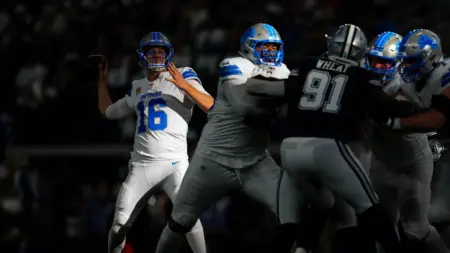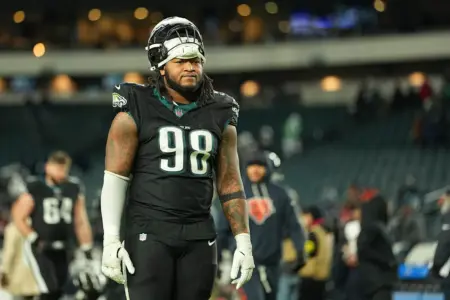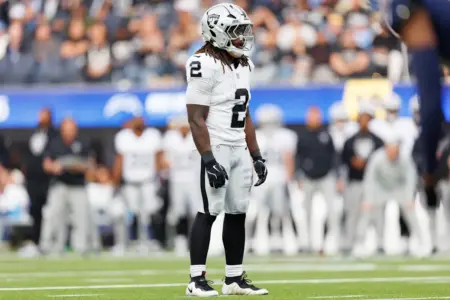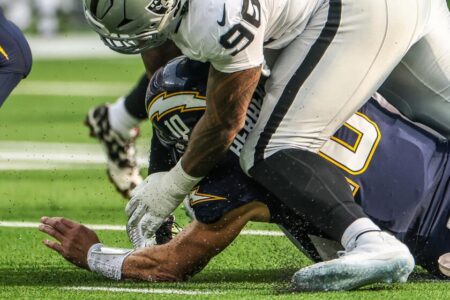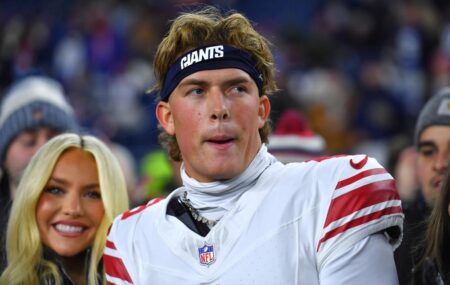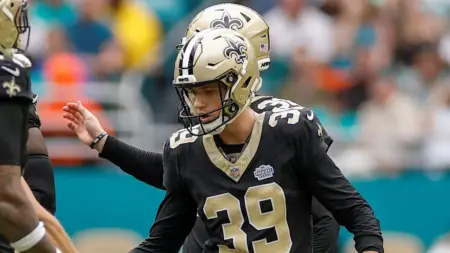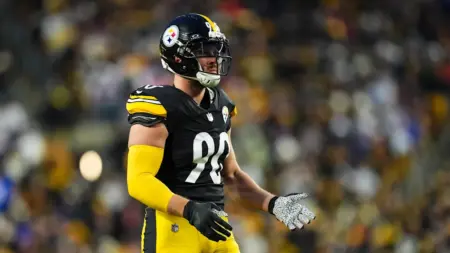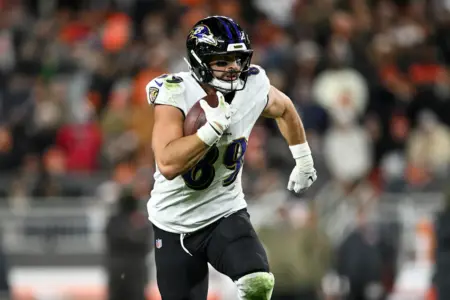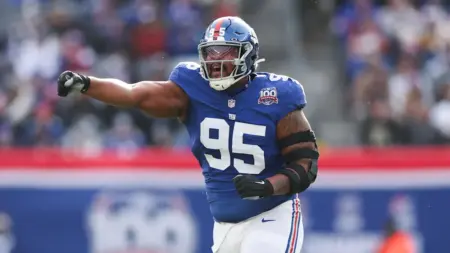J.J. McCarthy’s Chance at Starting
The NFL franchise tag deadline passed on Tuesday with just two teams using the official tag designation, but it still sparked significant activity across the league. One of the key beneficiaries from this activity is J.J. McCarthy, the 10th overall pick in the 2024 NFL Draft. McCarthy has not yet secured the Minnesota Vikings’ starting quarterback job, but his path to starting the 2025 season received a significant boost. The Vikings, despite their 14-game winning season with Sam Darnold, decided not to place a $40 million franchise tag on him. This decision increases the likelihood that Darnold will sign with another team in need of a quarterback, potentially leaving the door open for McCarthy to take over. While the Vikings haven’t entirely closed the door on re-signing Darnold, McCarthy’s opportunity is now more tangible, especially given the weak quarterback draft class this year.
Micah Parsons Benefits from Osa Odighizuwa’s Extension
Another significant winner from the franchise tag deadline is Micah Parsons of the Dallas Cowboys. The Cowboys preempted the tag deadline by signing defensive tackle Osa Odighizuwa to a four-year, $80 million extension with $52 million in guarantees. This deal has multiple positive implications for Parsons. First, it removes the need for the Cowboys to place the $25.1 million franchise tag on Odighizuwa, which would have significantly limited their cap flexibility for future negotiations. Second, Odighizuwa’s $20 million per year deal is lower than the $22-27 million range expected, giving the Cowboys more financial leeway. Lastly, keeping Odighizuwa in the defensive lineup enhances the unit’s overall effectiveness, as his presence in the interior will allow Parsons to thrive in his pass-rushing role.
Joe Burrow: A Mixed Bag
Cincinnati Bengals quarterback Joe Burrow finds himself in a slightly precarious position despite the franchise tag deadline. The Bengals placed a second consecutive franchise tag on receiver Tee Higgins, ensuring he will earn $26.2 million fully guaranteed in 2025. While this is a win for Burrow, as Higgins and Ja’Marr Chase form one of the most lethal receiver duos in the league, the situation is not entirely positive. The ongoing contract stalemate with Higgins, which dates back a year, and the lack of a long-term deal leaves the possibility of a trade on the table. Until Higgins signs a long-term contract, Burrow should remain cautious about his receiver’s future.
Caleb Williams: Gaining Stability
The Chicago Bears’ recent moves have significantly benefited quarterback Caleb Williams. The team hired Ben Johnson, a top head-coaching candidate, and traded a sixth-round pick for guard Jonah Jackson, who will bring stability and familiarity to the offensive line. Jackson, who has experience playing with Williams in Detroit, will help the quarterback by providing better protection and cohesiveness in play calls. Williams took a league-high 68 sacks in his rookie year, and with these upgrades, he can focus on improving his play and avoiding pressure. The added stability and improved line will be crucial for Williams’ development in his second year.
Matthew Stafford: Staying with the Rams
One of the most significant moves of the deadline was the re-signing of Matthew Stafford to the Los Angeles Rams. Despite interest from the New York Giants and Las Vegas Raiders, Stafford chose to stay with the Rams, where he has already built a strong rapport with the team and found success in the playoffs. The Rams offer a more robust roster and coaching infrastructure compared to the other interested teams. This decision not only secures Stafford’s future but also benefits the Rams, who can continue to build around a proven quarterback. Receiver Puka Nacua, who has excelled alongside Stafford, is another adjacent winner in this scenario.
Losers: Lovers of Suspense and More
While some players and teams gained from the franchise tag deadline, others found themselves on the losing end. Fans who enjoy the suspense and drama of franchise tag negotiations were disappointed this year, as only two players received the designation — the fewest since 1994. This lack of drama could mean less content for talk-show hosts during the summer months, but it also reflects the league’s ability to find alternative solutions and the rising salary cap that helps teams afford to lock up their stars.
Teams with running back deals on the horizon are another group of losers. Saquon Barkley’s two-year, $41.2 million extension and the Philadelphia Eagles’ foresight in extending their 2,000-yard rusher have set a high bar. While the salary cap is rising, evaluators view Barkley and Christian McCaffrey as outliers rather than a trend. This could make it challenging for other running backs to secure similar deals, leading to potential pushback from players who feel undervalued.
Teams in need of wide receivers also face a tough market. The 49ers’ trade of Deebo Samuel to the Washington Commanders and the Bengals’ decision to franchise tag Tee Higgins have significantly reduced the available options. The free-agent market is dominated by aging players, and the receiver draft class is weaker this year. Teams like the New England Patriots and Tennessee Titans, who need wide receiver help, may find it difficult to address this need.
AFC interior defensive linemen, particularly those trying to disrupt the Kansas City Chiefs, are another group of losers. Trey Smith, the Chiefs’ right guard, received the franchise tag, joining a strong interior line that includes center Creed Humphrey and left guard Joe Thuney. This group will be a formidable challenge for any defensive line, making it even more difficult for AFC teams to break through to the Super Bowl.
The San Francisco 49ers’ "bully ball" style, which has been a key to their success, may be affected by Deebo Samuel’s departure. Samuel, known for his physical play, was a crucial part of the 49ers’ aggressive approach. The 49ers will need to find a suitable replacement to maintain their edge, as Samuel’s departure to the Washington Commanders, where he can thrive under Dan Quinn and Adam Peters, represents a significant loss.
Finally, the New York Giants and Las Vegas Raiders are among the biggest losers. Both teams were interested in Matthew Stafford but lost out to the Rams. Without a clear plan at the quarterback position and with the third and sixth picks in the 2025 NFL Draft, they may be forced into a desperate trade to secure a franchise quarterback. The continued uncertainty at this crucial position could further delay their progress and success.


